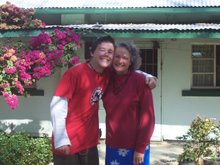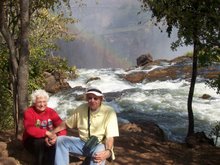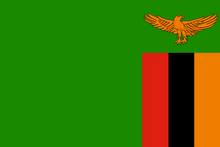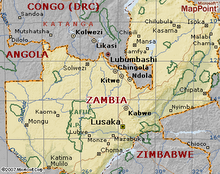As I was talking to some women, I noticed them referring to their husband's by their last names. It would be like me talking about Mellinger when I am talking about Ken. Last names are very important here. Many men go by their last names, and my parents don't even know some of their first names, because they have never heard anyone mention them! Upon getting married, many husbands give their wives an English name in place of their Tonga first name. But these English names are not used very often among the Zambians themselves. In Zambia, I would be known as "Bina Ryan"..the mother of Ryan (my first-born). Bina is prounounced "Bean-a". I have tried to learn the names of their children, so I can call the women by their Zambian names. Anytime we talk "their" language, it's appreciated greatly by them.
Also, relatives are not the same here. The women we would call Aunts, they call Mothers, so a person could easily refer to numerous women as "Mother". The people we call cousins on the father's side, they call sisters and brothers, but on the mother's side, they are called cousins! When Emma refers to her brother or mother, we usually ask her, "Is that your REAL brother?"... "So you mean your REAL mother?" Most families have relatives living with them, most often due to AIDS or the inability to provide. One custom here would be very hard for me...you do not talk to your in-laws, and you don't even relate to them. It is a way of respecting them, in showing you are lower than them. Just yesterday, Emma was walking in town with Edwin, who is getting married to Koyi next Saturday. Edwin saw Koyi's father coming down the sidewalk, and he immediately went into the nearest shop, because he must avoid him. Some would cross to the other side of the street to avoid the 2 meeting. If a message needs to be given to the father-in-law, the son-in-law would give the message to someone else to deliver. After a while, they might begin to slowly have communication, but it would look quite different....If you see 2 men kneeling in town talking, it would most likely be a father-in-law with a son-in-law beginning to have a little communication. After many years, sometimes 10-15, they might start talking, if they are confident of your respect. Carl and Phoebe, I am quite grateful to have a close relationship with you! Am I sure am glad that Ken can come and stay here in the same house with his in-laws in a few weeks!! I guess that will seem quite odd to these folks!
We have had some wonderful talks this week with a most humble and dear friend of my parents, Overseer Moses Munsaka from Ndola. He has been staying in the guest house all week. He will be presiding at the wedding this Saturday and has been doing premarital counseling with the couple this week. He has spent a good amount of time in the states, so he knows the difference in the 2 cultures quite well. His insight is so helpful and he has patiently and graciously answered my ton of questions! From marriage relationships, to courtships, to raising children, to death and funerals, to Biblical principles and Zambian customs, we have had such meangingful fellowship with him. I wish I had a tape recorder!
One of most shocking things that he witnessed while in the states was when he was at a wedding and the folks "dinged" their glasses for the couple to kiss. The bride was not close to the groom, so she said across the room, "Just kiss my Mom!" Moses couldn't believe his ears! For someone who would not even talk to his mother-in-law, this was unfathomable! The other disturbing thing for him during his stay in the states was when a woman died. The family he was living with went to the funeral home after the death, and Moses was so troubled to see the woman's husband there in the funeral home ALONE.... In Zambia, the community swarms to the home of the deceased immediately, for days and nights, providing comfort, care, meals, prayers, love, etc. There is no way someone would be left alone in that situation. Hopefully, that is not the norm even in the states, but I know it happens. In our pride and self-sufficiency, we often want to be "left alone" when we are hurting. But God created us to be relational, and perhaps we are missing out more than we realize when we "go it on our own". Moses articulated it well....with our "typical" funerals, it seems that we focus more on the dead person than on the one who is left, while their funerals are focused on the one left, who needs the support and love. It makes me think....I am very touched with the love they pour out on each other. People will walk hours to go to the home of a grieving friend. To send a card and not be present is offensive; your presence is what counts. People are very important here. Yes, we are in a very different culture. I have to remind myself that my customs are just as strange and different to them as theirs are to me! But then sometimes, I think they have it way over us! I am learning much from them, but how much will it change me? More unanswered questions...
Friday, August 3, 2007
Subscribe to:
Post Comments (Atom)




No comments:
Post a Comment